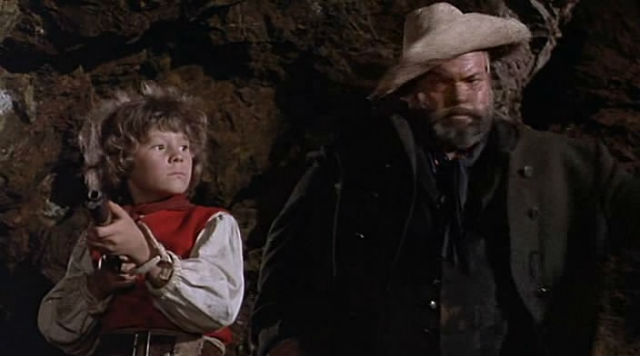Movie Review: Treasure Island (1972)
“Sail away into the all-new excitement of the greatest pirate adventure ever!”


Treasure Island (1972)
Director: John Hough
Cast: Orson Welles, Kim Burfield, Lionel Stander
Synopsis: A retelling of the famous Robert Louis Stevenson novel.
Orson Welles’ reluctance to appear in John Hough’s 1972 version of Robert Louis Stevenson’s perennial favourite is strangely reflected in the quality of the movie. Welles only offered to direct and star as Long John Silver in 1964 in order to secure funding for his cherished Falstaff project Chimes at Midnight, but he made only a cursory effort to make that version, despatching Jess Franco to film some second-unit material, before abandoning the pretence entirely. However, he was still legally obliged to make the movie if new funding was ever obtained, which it duly was in 1972. The only problem with that was that it was prolific British schlockmeister Harry Alan Towers into whose hands the resurrected project fell. Towers was a poor moviemaker but a shrewd businessman, and he had three versions of the movie made – English, Italian and Spanish – by three different directors. He also had the screenplay Welles had prepared for the 1964 version re-written – a fact that prompted the actor to request that his name be removed from the credits (he’s credited under the pseudonym O. W. Jeeves).
The movie has this strangely dispirited feel about it, even though it remains faithful to Stevenson’s plot and has much of interest to it. In fact, it’s pretty good for a Towers movie, despite numerous problems. Chief amongst these is Hough’s lacklustre direction. He was always something of a journeyman director, but every now and then he surpassed himself, and the following year he would helm the highly-regarded The Legend of Hell House, so it’s something of a mystery as to why his work here is so lacklustre, although the low budget might have a part to play. Having said that, there are a couple of scenes which stand out; in particular our introduction to Long John Silver in an agreeably grimy Spyglass Inn, in which he reveals the unexpected meaning of his nickname (it’s pirate slang for human meat) and introduces young Jim Hawkins (Kim Burfield) to his mulatto wife (Alibe).
While Welles is the obvious draw, other notable names include Lionel Stander (Mr Deeds Goes to Town, Once Upon a Time in the West), making absolutely no attempt to disguise his American accent, as Billy Bones, Walter Slezak (Michael, Lifeboat), in his final screen appearance, as Squire Trelawney, and Towers’ wife Maria Rohm (The Blood of Fu Manchu) as Jim’s rather choice mum. The rest of the cast is largely made up of the usual mongrel collection of Euro actors. Unlike Slezak, Welles at least has a stab at some kind of accent, although what exactly it’s supposed to be is something of a mystery. Apparently, he recorded it over one night while becoming increasingly drunk, and he’s even dubbed by another actor in some prints. It’s an under-stated performance, probably consciously as far-removed from Robert Newton’s ‘Aargh, Jim Lad!’ shenanigans in Disney’s version as he could get, and it adds a measure of menace to his portrayal that Newton’s lacks.
Welles is always worth watching, even though he appeared in a lot of movies that were beneath him. Treasure Island is a long way from being the worst movie he ever made, and is watchable enough, despite its lack of excitement and a failure to create any sense of urgency or real danger once the action transfers to the titular island.
(Reviewed 1st January 2015)
httpv://www.youtube.com/watch?v=hP3iKhfMKcM


0 Comments